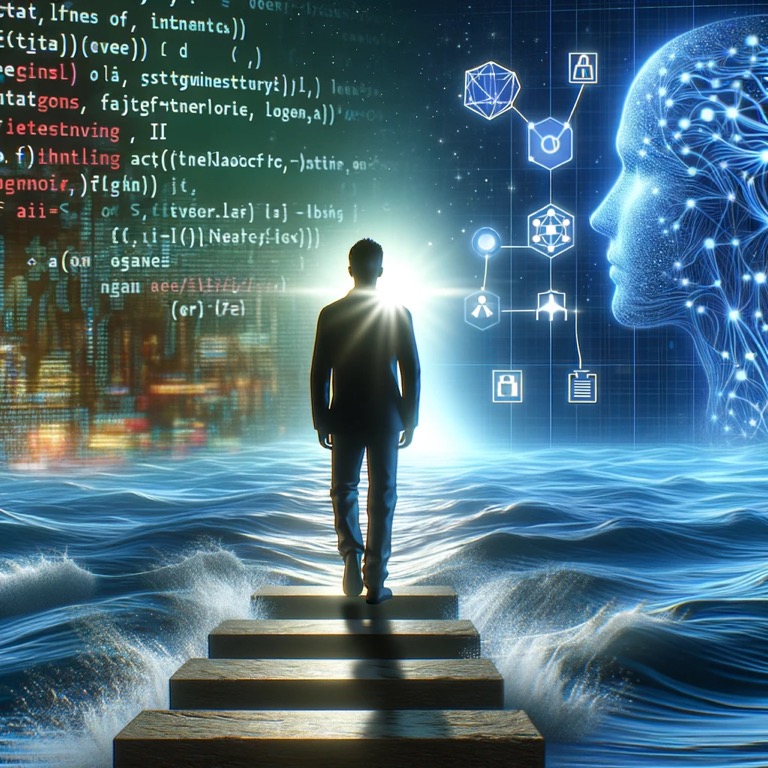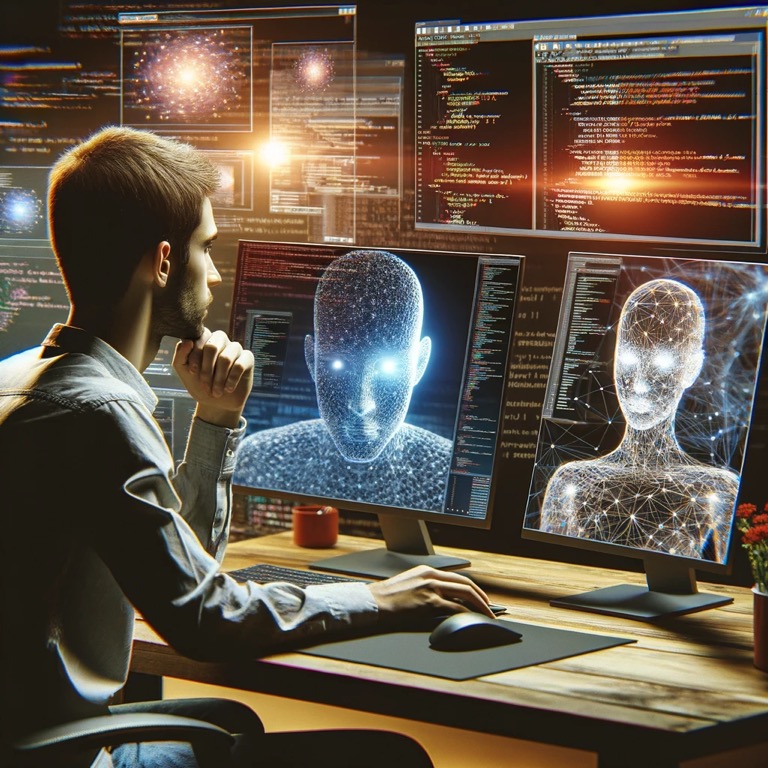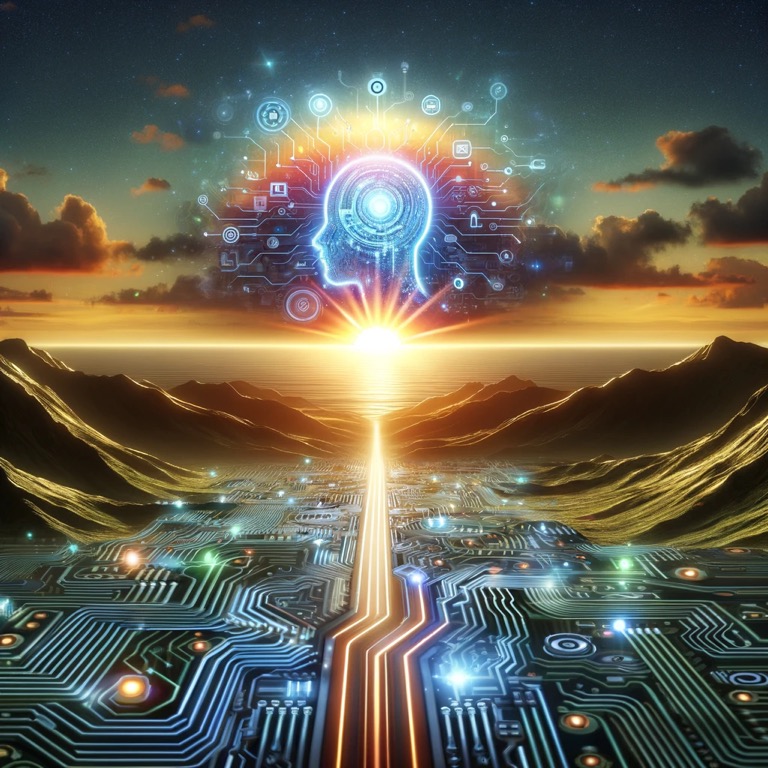How Will AI Affect Software Engineering? If you’re a software engineer, you’ve probably considered how artificial intelligence (AI) might affect your career.

From automating mundane things coding tasks to revolutionizing how we approach complex problems, there seems to be no limit what AI can do.
We currently see AI in software engineering mainly geared towards automating tasks like testing and debugging. This isn’t just about improving efficiency; it’s also about enhancing the accuracy of these processes, potentially reducing the bugs that slip through to production.
- However, AI isn’t taking over just yet. It’s aiding in basic tasks, supporting rather than replacing the work of skilled engineers.
I believe that a healthy, understanding is essential for any software professional. Why? because I believe that understanding AI can increase developers efficiency
How can AI help me?
Testing
The integration of AI in software engineering isn’t just about reducing workload; it’s transforming how we approach complex problems in the field. Take testing and debugging for instance. AI algorithms are becoming adept at identifying bugs more quickly than their human counterparts, which can significantly accelerate the development cycle.
Quality
Improving software quality is where AI really shines. By analyzing patterns within code, AI tools can predict where errors might occur, even suggesting fixes.
This predictive power is incredibly useful, although it’s not foolproof. There are complexities in software creation that AI is still learning to navigate.
For example, understanding the nuanced requirements or the context behind certain features often requires a level of creativity and insight that AI currently lacks.
That’s where the symbiotic relationship between human engineers and AI becomes clear. Humans bring creativity, experience, and the ability to understand abstract concepts to the table. Meanwhile, AI provides the brute force of processing power and data analysis. This partnership, though in its nascent stages, is pivotal for pushing boundaries and driving innovation in software engineering.
Still, I’m going to level with you: we need to recognize the limits of what AI can and can’t do today. While AI excels at pattern recognition, it doesn’t yet possess the full breadth of understanding that a seasoned software engineer holds. That’s precisely why the human element in software engineering isn’t disappearing anytime soon. As AI continues to grow smarter, we’re going to find out how it supplements human expertise rather than replaces it, especially as we venture into more intricate areas of development.
The Double-Edged Sword: AI’s Impact on Job Dynamics
You might be wondering how AI will shape your career in software engineering. Well, it’s a mixed bag. On one hand, AI could make some skills obsolete, especially those that involve repetitive and routine tasks.
As AI systems get smarter, they’re beginning to handle more of these ‘grunt work’ elements, freeing up engineers for more complex and intellectually stimulating work.
But that’s not the whole story. There’s also a concern about job displacement. As AI becomes more capable, the fear is that there will be less need for human intervention.
You can look at the manufacturing sector as a historical precedent, where automation led to fewer jobs on the production line.
However, it’s not all doom and gloom. AI is creating as many opportunities as it is displacing, if not more.
New fields like machine learning, data science, and cybersecurity are booming. These disciplines need sharp minds that can navigate new challenges, refine algorithms, and protect systems from intelligent threats.
To secure a place in this changing landscape, it’s essential to look beyond the horizon. Software engineers must adapt by acquiring new skills that will be in demand in the AI-augmented workplace.
Developing an expertise in AI itself, understanding its capabilities and limitations, and figuring out how to integrate it with human creativity is the key.

I really hope that you see these changes not as a threat, but as an incentive to grow. The idea isn’t to compete with AI but to complement it.
Think of it this way: your role might shift from coding every single line to overseeing AI systems that can help you do it better and faster. It’s about evolving your skillset and finding your niche in a new, AI-driven engineering environment.
Adapting to the AI Revolution: Empowering Software Engineers
You’ve seen how artificial intelligence is reshaping the terrain of software engineering – a landscape where routine tasks are now under the domain of sophisticated algorithms. As we peel back the layers, it’s clear that AI isn’t just automating tasks; it’s also altering job dynamics and creating a fertile ground for innovation and new career paths.
If you’re a software engineer or someone who’s part of this industry, the message is to stay nimble. Embracing AI tools and technologies isn’t just a recommendation; it’s a necessity to stay relevant in an ever-evolving field. This means rolling up your sleeves and getting comfortable with concepts and techniques that make AI tick – machine learning, neural networks, data analysis, to name a few.
At the same time, this transformation doesn’t spell doom for the creative and complex aspects of software engineering. On the contrary, it allows you to focus more on those elements by offloading the mechanistic parts to AI. This shift can lead to software engineering becoming even more creative and strategic than it is today.

In the end, it’s about viewing AI as an ally, one that can enhance your efficiency and complement your skills. Continuous learning is key – attending workshops, taking online courses, going for certifications, and staying engaged with the latest AI developments will ensure that your expertise remains in demand.
I encourage you to use AI to supercharge your skills.
So, expect change, prepare for it, and use AI as your stepping stone to higher, more complex, and rewarding echelons in the software engineering world. Choose something that resonates with your interests and strengths in AI, dive in, and watch as it unfolds opportunities you hadn’t even imagined. This isn’t the end of a era for software engineers; it’s the beginning of a new chapter filled with potential.
Hopefully, this article relieved your fears. Now it is time to get started in software development.
I have been in the web development industry since 2016. It is my desire to guide aspiring and seasoned developers alike through the complex landscape of web development and software engineering. I combine my academic prowess, with degrees from Western Governor University and a Boot Camp certificate from Bloom Tech, with real-world experience to educate and inspire.
As the force behind DevTuneUp.com, I offer a treasure trove of tutorials, how-tos, and insights into the ever-evolving tech industry. With a sharp focus on demystifying technology and a goal to make DevTuneUp.com a cornerstone for tech enthusiasts, I leverage my expertise in SEO optimization and social media marketing to reach and empower a global audience. Join me on this journey to navigate the digital world with confidence and skill.
Hi there Jordan
Thanks so much for your knowledge and input about AI and software engineering,I think that as much as AI may look scary now,I’m sure once we embrace and accept it fully,we will only benefit.
I think artificial intelligence(for now)may spell doom to some but when used properly I think it can only improve things and if we learn to use it properly, it can only make tasks easier in the future.
Thanks so much for sharing your opinion, really appreciate your insights.
This is a fascinating exploration of the evolving relationship between AI and software engineering. The emphasis on AI’s current role in automating tasks like testing and debugging, enhancing accuracy, and reducing production bugs is insightful. The acknowledgment that AI is currently a support tool, not a replacement, underscores the importance of human expertise in the field.
The discussion on how AI aids in testing, accelerating development cycles, and improving software quality is valuable. The recognition of the symbiotic relationship between human engineers and AI, with humans contributing creativity and insight while AI provides processing power, is a crucial insight into the future of software development.
Your article’s balanced perspective on the double-edged sword of AI’s impact on job dynamics, making some skills obsolete while creating new opportunities in fields like machine learning and cybersecurity, adds depth. The encouragement for software engineers to adapt, acquire new skills, and view AI as an ally rather than a threat is a positive and forward-looking approach. very well done!
Great post, Jordan! You’ve touched on some crucial points about the impact of AI on software engineering. Your insights into how AI is revolutionizing testing, debugging, and even predicting errors within code are fascinating.
I’m curious, though, how do you see software engineers adapting to this changing landscape? With AI becoming more capable, what new skills or approaches do you think will be essential for engineers to stay ahead in their careers?
I think to stay ahead of the game you need to master prompt engineering. If software developers dont adapt they will be left behind
Just wanted to say I appreciate this article on the impact of AI on software engineering. I found it informative and reassuring to see how AI can enhance efficiency and complement the skills of human engineers. However, I’m curious about the potential ethical implications of AI in software engineering. As AI becomes more advanced, do you think there is a need for ethical guidelines or regulations to ensure responsible and unbiased use of AI in this field?
Absolutely here are a few considerations:
Ethical Guidelines: There is indeed a growing consensus among industry experts, academics, and policymakers that ethical guidelines are essential for the responsible development and deployment of AI systems. These guidelines often emphasize principles such as transparency, fairness, accountability, and respect for user privacy.
Bias and Fairness: AI systems are only as unbiased as the data they are trained on. Ensuring that AI algorithms make fair and impartial decisions, especially in critical applications like hiring, law enforcement, and healthcare, is a significant ethical concern. This requires careful design, continuous monitoring, and regular auditing of AI systems to identify and mitigate biases.
Regulations and Standards: While the field is still in the early stages of regulatory development, there is a clear movement towards establishing legal frameworks and standards to govern the use of AI. This includes efforts to ensure that AI systems are safe, reliable, and aligned with societal values and norms.
Human Oversight: Ensuring that human oversight is a central component of AI systems is crucial. This means that decisions made by AI should be interpretable and subject to human review, especially in high-stakes scenarios. The role of software engineers in overseeing and guiding AI decision-making processes is paramount to ensure that the technology is used responsibly.
Education and Awareness: Educating software engineers, stakeholders, and the general public about the capabilities, limitations, and ethical considerations of AI is essential. This helps in setting realistic expectations and fosters a culture of responsibility and ethical awareness in the development and use of AI technologies.
Hello Jordan,
Thank you for providing a comprehensive overview of how AI is impacting software engineering and the importance of embracing AI as an ally rather than viewing it as a threat. I am glad that I found this page because it has taken away a bit of my fear and frustration regarding using AI.
As a software engineer, how do you perceive the role of AI in your field? Have you already started adapting to AI tools and technologies, and if so, what specific skills or areas have you focused on to stay relevant in this evolving landscape?
Enrolling in courses online related to AI, prompt engineering, and natural language processing set you apart from other developers. Websites like Coursera, edX, and Udemy offer a wide range of courses on these topics.
For more resources, you can also explore this Google search for “study prompt engineering ChatGPT”: [Google Search](https://www.google.com/search?q=study+prompt+engineering+ChatGPT)